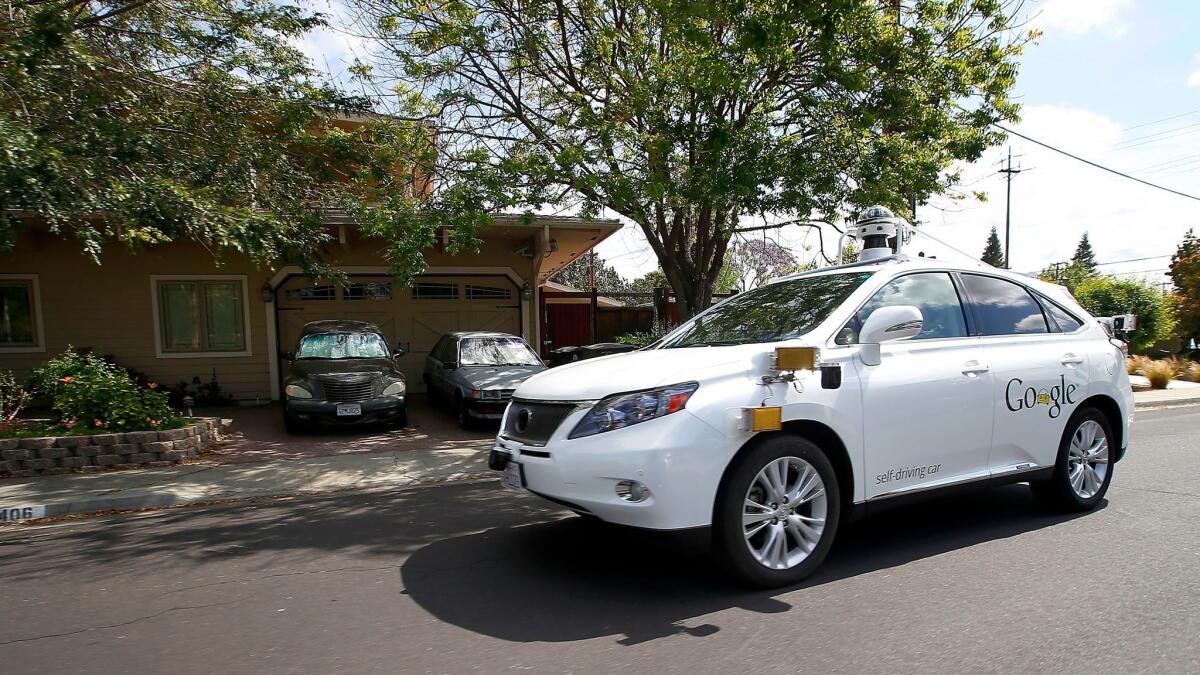Robot cars — with no human driver — could hit California roads next year

- Share via
Reporting from San Francisco — California is back on the map as a state that’s serious about welcoming driverless cars.
Truly driverless cars — vehicles with no human behind the wheel, and perhaps no steering wheel at all — are headed toward California streets and highways starting in 2018.
After months of criticism, state regulators Friday released a proposal for a new set of regulations to govern the testing and deployment of driverless cars on public roadways. They are seeking public comment and expect approval by the end of the year.
The regulations lay out “a clear path for future deployment of autonomous vehicles” in California, said Bernard Soriano, deputy director at the Department of Motor Vehicles.
The move comes after months of dissatisfaction with the DMV concerning an earlier set of proposed regulations considered draconian and anti-innovation by automakers and technology companies — especially compared with those of other states.
Florida and Michigan allow driverless cars on their roadways with few restrictions. Arizona has no driverless vehicle laws at all, and the state’s governor has made clear that driverless cars and trucks are welcome on Arizona highways.
Testing of driverless cars with a human behind the wheel has been allowed in California under certain conditions since 2014.
The new plan is much friendlier to driverless car testing but it’s no free ride. The DMV has long made clear that it must balance the introduction of new technology with public safety, and although driverless cars hold the promise of far fewer crashes and highway deaths, the technology is not fully baked.
Testing companies will be required to comply with federal safety standards and certify that their robot cars can adhere to California traffic laws and regulations. “If you program your vehicle to obey the law, it’s not going to run over pedestrians or crash into other automobiles,” Soriano said.
Communications technology monitored by a remote operator that could take immediate control of the car would be required.
The proposals also include regulations that could eventually result in deployment of driverless taxis and driverless vehicles for sale to the general public.
But some tough provisions in the earlier proposals have been softened or removed. Rather than seek special permission from each locality a driverless car passes through, a testing company merely needs to inform each locality of its plans. Instead of working out an emergency plan with each law enforcement and first responder unit that might be involved, the testers instead can file a communications plan.
The original regulations demanded that data be turned over to law enforcement after a crash. That’s been scrapped, though Soriano said testers are still subject to subpoena.
“California has taken a big step,” said Bryant Walker Smith, an expert in autonomous vehicle law at the University of South Carolina. “As I understand them, the DMV’s rules are a sea change from what was proposed.”
“The new proposed autonomous-vehicle regulations are a positive step for the California DMV,” said Grayson Brulte, an autonomous technology consultant in Beverly HIlls. “The new proposed autonomous vehicle regulations clearly demonstrate the state of California’s commitment to the development and advancement of autonomous vehicle technology.”
Brad Stertz, director of government affairs for Audi in Washington, D.C., lauded the DMV for striking a “delicate balance” between safety and technology.
Not everyone is thrilled, though. “The new rules are too industry-friendly and don’t adequately protect consumers,” said John Simpson of Santa Monica-based Consumer Watchdog.
Among the new proposals is a rule that bars advertisements that mislead customers about a car’s autonomous capabilities.
“If you use terms that imply that a vehicle is autonomous and it’s not, we would consider that an advertising misstatement,” Soriano said.
In earlier proposals the DMV singled out names such as “autopilot” as possible violations. This time, “we are not calling out specific terms,” Soriano said.
A spokeswoman for Tesla, whose cars are fitted with a semi-autonomous system called Autopilot, said the company appreciated that the DMV had refined its proposed regulations since last year’s draft.
“We are also pleased that the DMV removed the proposed restrictions around use of the name ‘Autopilot.’ Our customers have made clear that they understand Autopilot’s intended use.”
Twitter: @russ1mitchell
ALSO
If you like cars, not trucks, it’s a good time to buy
Volkswagen pleads guilty in U.S. diesel emissions scandal
Alfa Romeo’s Giulia Quadrifoglio is a wolf in sheep’s clothing
UPDATES:
3:45 p.m.: This article was updated with a comment from Audi.




